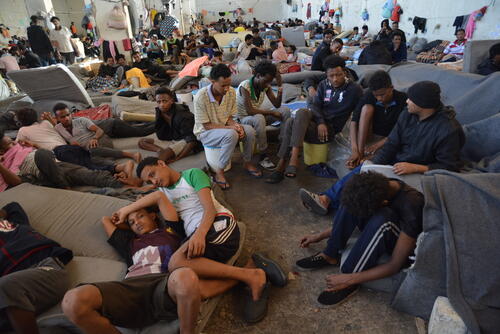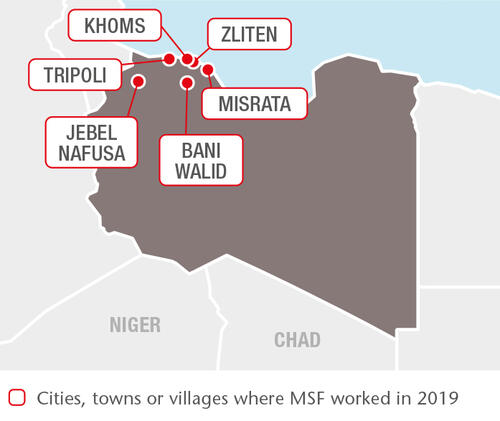
22,500
22,5
1,520
1,52
210
21
According to the United Nations refugee agency, UNHCR, there are more than 355,000 internally displaced people and nearly 50,000 registered refugees in the country.
In Libya, in 2019, Médecins Sans Frontières (MSF) treated men, women and children who had been arbitrarily detained in official detention centres run by the Libyan authorities, as well as those who had escaped clandestine prisons run by traffickers. Our teams also provided care to people who had been intercepted at sea by the EU-funded Libyan coastguard and forced back to Libya, the country they had been trying to flee.
In detention centres in Tripoli, Misrata, Khoms, Zliten and Dhar El-Jebel, MSF medical teams mainly treated medical complaints resulting from, or aggravated by, the dire hygiene conditions. The overcrowded facilities do not have enough drinking water, latrines or ventilation, and detainees have little access to medical assistance. We treated people for scabies, lice and fleas, as well as infectious diseases such as tuberculosis (TB), which spread easily in squalid conditions. In Dhar el-Jebel, we started an intervention for 500 people detained in the centre, after 22 died from TB. In addition, our teams treated patients for malnutrition resulting from the lack of food in the centres and carried out mental health activities, supporting people living with the trauma of indefinite detention.
Most migrants and refugees are believed to be detained in unofficial prisons, out of reach and out of sight. In Bani Walid, we provided medical assistance to people who had managed to escape captivity, many of whom had been tortured.
On 2 July, an airstrike hit the Tajoura detention centre and instantly killed at least 53 people – the deadliest attack on civilians since the start of the conflict. We sent ambulances and a medical team to assist survivors, including mental health staff to support people left in limbo and in fear for their lives.
In port areas of Khoms, our teams offered general healthcare to people who had been forcibly returned to Libya, including minors and asylum seekers, and to survivors of shipwrecks.
The closure of detention centres led to increasing numbers of migrants and refugees living on the streets. More and more people were left stranded and vulnerable to human trafficking, violence, forced labour and exploitation. As the conflict intensified and the deterioration of public health services started to affect Libyan nationals, we also conducted outpatient consultations in Misrata.
As well as continuing to denounce the unacceptable situation in official and unofficial detention centres, MSF called on the UN to scale up its intervention in Libya to provide protection and assistance for refugees, asylum seekers and migrants trapped there. We also advocated an immediate end to forced returns, and ultimately, the evacuation of all migrants and refugees from a country at war to a place of safety.

















